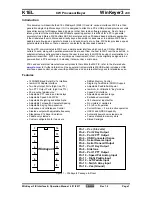
SN8P2511
8-Bit Micro-Controller
SONiX TECHNOLOGY CO., LTD
Page 48
Version 1.2
5.5 GREEN MODE
The green mode is another system ideal status not like power down mode. In power down mode, all functions and
hardware devices are disabled. But in green mode, the system clock source keeps running, so the power consumption
of green mode is larger than power down mode. In green mode, the program
isn’t executed, but the timer with wake-up
function actives as enabled, and the timer clock source is the non-stop system clock. The green mode has 2 wake-up
sources. One is the P0, P1 level change trigger wake-up. The other one is internal timer with wake-up function
occurring overflow. That
’s mean users can setup one fix period to timer, and the system is waked up until the time out.
Inserting green mode is controlled by CPUM1 bit of OSCM register. When CPUM1=1, the system inserts into green
mode. After system wake-up from green mode, the CPUM1 bit is disabled (zero status) automatically.
The program stops executing, and full functions are disabled.
Only the timer with wake-up function actives.
The oscillator to be the system clock source keeps running, and the other oscillators operation is depend on
system operation mode configuration.
If inserting green mode from normal mode, the system insets to normal mode after wake-up.
If inserting green mode from slow mode, the system insets to slow mode after wake-up.
The green mode wake-up sources are P0, P1 level change trigger and unique time overflow.
PWN and buzzer output functions active in green mode, but the timer can
’t wake-up the system as overflow.
Note: Sonix provides
“GreenMode” macro to control green mode operation. It is necessary to use
“GreenMode” macro to control system inserting green mode.
The macro includes three instructions. Please take care the macro length as using BRANCH type
instructions, e.g. bts0, bts1, b0bts0, b0bts1, ins, incms, decs, decms, cmprs, jmp, or the routine would
be error.
















































